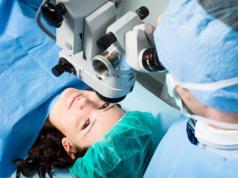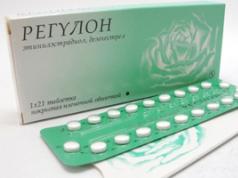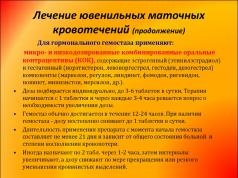Hello. I had my lower one removed 2 days ago chewing tooth. Removal was not particularly simple, the doctor fiddled around for about 10 minutes + there was a cyst. So, after removal, the hole doesn’t seem to hurt, but the neighboring teeth hurt when there is pressure on them. Is it normal or not?
Thanks in advance for your answer.
Consultation:
Good evening.
Removal in 10 minutes speaks about the professionalism of your doctor; quality work in such a time is great.
Now let's talk about the hole: I'm interested in this - is there bad smell?
This important point and he talks about healing.
The fact that it hurts to clench your teeth for some time - there is a reaction of the teeth adjacent to the extracted tooth - is normal. Still, removal is an injury, and it will be accompanied by inflammation while it heals. The main thing is that there is no constant pain together extracted tooth
Therefore, there is no need to worry yet.
Observe your feelings. If it becomes easier every day and it hurts less, then everything is fine. If it is painful to press on the adjacent teeth even after a few days, then you will have to go to the doctor and take a photo to see how the healing is progressing.
 There is a slight unpleasant smell, it seems to me that the hole does not bother me at all.
There is a slight unpleasant smell, it seems to me that the hole does not bother me at all.
How long is a few days, approximately? (I removed a tooth for the first time - sorry for the interrogation)
and what color should the clot be? I've read a lot of information... I have a gray gum with a small white coating on my gums.
 white bloom- this is a fibrous plaque (it always appears during healing and indicates the normal course of the process). If it takes on a dirty greenish tint and pain appears, then you need to see a doctor.
white bloom- this is a fibrous plaque (it always appears during healing and indicates the normal course of the process). If it takes on a dirty greenish tint and pain appears, then you need to see a doctor.
If you don't feel pain and there's no strong putrid smell, it means everything is going well.
And the pain is strong, shooting, it is impossible to miss it.
In general, after removal, an inspection is required - to follow up. day or every other day. Usually it's free, the doctor will just see how the healing is going. This will make both you and him feel calmer. If you didn’t show up, don’t be lazy, run for 5 minutes to the clinic where the tooth was removed.
Teeth begin to hurt suddenly and often at the most inopportune moment. A person has no choice but to go to an appointment with a dentist, after examining the oral cavity, he makes a decision on treatment or removal.
Everything seems to be fine, the diseased tooth has been removed, but after some time, after the anesthesia wears off, painful sensations come back, but only to the adjacent tooth, and the question immediately arises, why is this happening and how long will it last?
If a neighboring tooth hurts after tooth extraction, this may mean the following:
- During surgical intervention into the roots of a tooth, tissue and gum damage occurs; often the doctor has to suture the gum and because of this, the pain can spread to neighboring teeth.
- The process of infection spreading to neighboring segments that are located next to infected wound, pain may be accompanied by fever, inflammation of the cheeks and gums, pain in the head.
- During the extraction operation, damage occurred to the roots of an adjacent tooth or from it. If this happens, you need to make a second visit to the dentist's office.
- Painful sensations may occur due to negligence of the doctor’s recommendations.
After tooth extraction, the occurrence of pain is a natural reaction and normally this will occur for three days.
These sensations appear due to the fact that during surgery, damage to the gums and soft tissues occurs. If the pain does not leave a person for a long period of time, it is necessary to contact the dental clinic.
Duration of pain
During tooth extraction, damage to the gums occurs; after the procedure, neighboring teeth begin to shift and touch the site of injury and because of this, pain occurs, usually it is aching and goes away after 3-5 days.
If the removal was more complicated, the pain may not leave the patient for up to half a month. It may be accompanied by headaches, swelling in the cheek area and swelling of the gums.
In many cases, all symptoms may go away on their own after some time.
How to relieve pain?
 Usually the painful sensation goes away on its own after a few days, but if this does not happen or the pain is hard to bear, you can use some remedies to alleviate the condition.
Usually the painful sensation goes away on its own after a few days, but if this does not happen or the pain is hard to bear, you can use some remedies to alleviate the condition.
Doctors make appointments for patients after surgical procedures. In addition to medicines, you can use a variety of baths.
The following methods can be used to relieve pain:
- If you have severe pain, then you can take medications prescribed by your doctor or the dosage depends on the intensity of pain. Ketanov is the most popular tablet for pain, two tablets are taken. every 6 hours. If the pain is acute, you can take Nurofen or Ibuprofen several times during the day. You cannot take pills at your own discretion; you must always follow the doctor’s recommendations or instructions.
- The first few hours after removal You can apply cold compresses to the cheek area. By applying this method you can get rid of unpleasant sensations, calm your nerves and promote the most rapid healing wound
- After a few days you can make baths with a mixture of baking soda, salt and 3-4 drops of iodine. carried out as often as possible throughout the day.
- You can use baking soda and salt for the same procedures. both together and separately from each other. Such procedures are carried out at least three times a day.
- Decoctions of medicinal plants contribute well to wound healing. To prepare, you need to make a decoction of St. John's wort or chamomile and leave for a little while. You should not rinse your mouth because the socket is washed out; different types complications. Instead of rinsing, you just need to put the broth in your mouth and hold it for a while, then spit it out.
- Can be taken medicines antihistamine type. With their help, the effect of painkillers is enhanced and swelling is reduced. In addition, these medications have a hypnotic and sedative effect.
Important! No matter how severe the pain is after tooth extraction, it should gradually decrease. If this does not happen or the pain in neighboring teeth only intensifies, despite taking medications, you need to go to the dental clinic as soon as possible.
After the surgical procedures, the doctor will give the patient some recommendations, if followed, the rehabilitation period can be facilitated.

For the fastestTo get rid of pain as quickly as possible, you must adhere to the following recommendations:
- If a tooth is removed without possible complications, after the operation, you must immediately take the painkiller recommended by the dentist; you must take the drug while the anesthesia is still in effect. In many cases, this method helps to avoid pain.
- After tooth extraction, you should try not to bend too much or resort to physical activity, to avoid blood flow to the removal site, otherwise bleeding may occur.
- It is necessary to refrain from eating spicy, hot food and drinks, and also temporarily give up alcohol, smoking, and visiting baths and saunas.
- After the operation, it will be better if the patient sleeps or rests. You should not eat on the side where the tooth was manipulated, and try to strain and load your jaw as little as possible.
- If the doctor allows, you can apply a cold compress (for 15 minutes) to the side where there are painful sensations.
- You should not rinse your mouth, as this may cause it to wash out and cause the formation of alveolitis.
- Teeth should be brushed as usual, but the extraction site should be treated with special care.
After tooth extraction, patients are almost always accompanied by pain. There is no need to worry about this, the pain will go away on its own after some time.
If the pain does not go away, but only increases and is accompanied by various symptoms, you need to consult a dentist as soon as possible, this will be the best option in solving the problem.
Patients who have had teeth pulled out are interested in why neighboring teeth hurt after tooth extraction. Following the logic that a diseased tooth in oral cavity is no longer there, there should be no unpleasant sensations. There are several reasons why they may still arise. Some of them are neutral, but some are negative and require a visit to the dentist.
The most common reason why does the neighboring tooth hurt after tooth extraction? - psychological aspect. Phantom pain is not only common during limb surgeries. However, if the feeling is persistent and vivid and does not go away over time, the problem is different. This may be inflammation, swelling, or even the continued spread of dental disease.
Only 10% of dental patients experience serious discomfort after tooth extraction. Painful and quite long lasting recovery period - common occurrence after surgery or tooth extraction. The holes formed after these procedures can become inflamed or painful simply due to the fact that food or tongue puts pressure on them, which have not yet healed. But the areas of the gums and teeth next to the hole should not hurt under any circumstances.
Most often, unpleasant sensations occur in hypersensitive people prone to phantom pain and patients of low-quality dental clinics. If the former can gradually stop experiencing pain, then the latter must definitely find out exactly the cause of their ailment, and then contact their treating or newly selected doctor.

The reason why the area surrounding it hurts after tooth extraction may primarily lie in an incorrectly performed operation. Regardless of whether it was surgical removal or a tooth has been pulled out, the dentist, when performing one of possible procedures used special tools. If teeth are pulled out, they use forceps, sometimes drills and small sharp instruments that help loosen the tooth. In rare cases, the gum is slightly incised. Sharp devices can injure soft and bone tissue person.
The reason described above is traumatological. It is associated with the human factor; if it is detected, you should change the clinic and recover from the complications that arise. But there are a wide range of other possibilities:
- Inflammation of the socket. If a pathogenic substance (a piece of food, a solid inedible element) gets into the wound left after tooth extraction, then inflammation will develop in its tissues. On late stages it turns into putrefaction and tissue death. The nearest area of soft tissue is affected, and with severe inflammation, the gums may be affected up to the adjacent incisors. In this case, the pain will be associated with problems with the gums, and not with the bone tissue itself.
- Spread of caries or other dental disease. Even if the diseased tooth has already been removed, the disease, which was in an incubation state, can continue to develop on neighboring teeth. To avoid these complications, the treating specialist is obliged to examine the adjacent teeth. If such a procedure has not been carried out, then there is a great risk further development destructive processes such as dental caries.
- Stomatitis. It is easy to confuse the sharp and not clearly oriented pain of an emerging cyst with pain from pressing on a bone. It occurs when eating food and clenching the jaw, so patients often confuse these types. For stomatitis on soft tissues (mainly on inside cheeks) small purulent formations develop. Over time, they dissolve, but cause severe discomfort until they disappear. When a person touches them, it especially hurts. Stomatitis is easily formed under the influence of foreign substances that enter the wounded mucosal site. When a tooth is removed and food gets into the hole, stomatitis develops with a probability of 60% (with improper oral hygiene).
- Swelling. The natural swelling of the gums can cause mild pain around the site of their occurrence, as they press on the soft tissues and the sensitive root of the incisor or canine.
Each of the four causes has its own symptoms, based on which a specific root cause of pain is determined. Each of them requires specialized treatment under the supervision of a doctor. Dentistry is the best solution.

To collect a history of symptoms and contact a dentist, you first need to make sure what exactly is bothering the patient. It is possible to determine that the problem is associated precisely with pain in the teeth adjacent to the extracted one, according to the following signs:
- Discomfort when eating food. Any food, even soft, causes discomfort of varying degrees.
- Painful sensations when pressing on the incisors. This is the most the right way check.
- A person involuntarily begins to eat on one (opposite hole) side of the jaw and sleep only on a certain side. Busy people may simply ignore or ignore the discomfort, and this is the only way to tell if they have a problem.
- Soreness is felt not only in the area of the healing wound, but throughout the entire dentition around. The pain is not sharp, like with wounds soft tissue, but pulsating and dull.
After detecting the primary symptoms (pain), it is necessary to figure out what the original problem of the malaise is. This is determined in a dental clinic through a doctor’s examination. Sometimes an analysis of the mucous membrane is required to accurately recognize the nature of the inflammation. Often, the exact cause of pain is recognized after the first visit to the dentist, after which a full course of therapy and recovery is prescribed.

Depending on the type of disease detected, it is necessary to undergo therapy according to the recommendations of the attending physician. Most often you have to contact dental clinic repeatedly, so that gum or dental disease is compensated through surgery. Caries can only be professional treatment, stomatitis in some cases has to be removed.
After completing a course of therapy Special attention The attending physician pays attention to the healing of the hole. She happens to be main reason problems after tooth extraction in the oral cavity. Appointed complex therapy in the form of healing ointments, rubbing.
In some cases (acute inflammation, special sensitivity of the patient), the pain is so severe that it prevents the patient from living peacefully. While the cause is being eliminated, which can range from 2 to 14 days, the dentist prescribes a course of painkillers. Usually this is Nurofen or No-shpa, aimed specifically at reducing individual pain. As part of primary anesthesia or pain relief for 1–2 days, it is sometimes permissible to use more strong drugs. Their use depends on the body’s reaction to novocaine and other painkillers.
If you notice pain around the hole from a just extracted tooth, you should not leave things to chance. Any problem in the oral area requires diagnosis and, if necessary, comprehensive or symptomatic treatment. The attending physician must carry out therapy if the problem arose through his fault.
Timely relief from pain reduces the risk of further development of inflammation, stomatitis, and tooth decay. The prescribed therapy is simple and not expensive. The main condition for maintaining oral health is courage in making the decision to visit the dentist.
Any impact on the body causes certain reactions, especially when it comes to various kinds surgical interventions. Thus, tooth extraction causes completely natural stress and tissue damage. This can explain the presence pain syndrome, so in most cases it is a normal reaction of the body, because in your mouth you have open wound, which causes discomfort. In addition, tooth extraction may be accompanied by various complications, for example, damage to the periosteum, gum tissue, bone and nerve endings. How long do such pains last and when should you worry?
Unpleasant sensations can bother you for quite a long time, their duration depends on the complexity of the intervention performed, individual features body, the presence of any complications. In the presence of inflammatory processes, the pain intensifies, in this case the patient needs additional therapeutic effects, which must be carried out only under the supervision of a dentist.
Tooth hurts after extraction
You should not use any folk remedies without consulting a doctor. Do not rinse your mouth herbal decoctions and infusions, apply various lotions, as this can only provoke the development of inflammatory processes. Self-medication can greatly aggravate the situation.
Depending on what causes the pain, normal postoperative period or the development of inflammation, the measures that should be taken differ. In the first case, the patient may need to drink some kind of mild analgesic, and in the second, he may even need surgical intervention.
You definitely won’t harm yourself if you place propolis in your mouth. This substance has strong antibacterial activity, so you can simply put a piece of it behind your cheek. This will reduce the number of pathogenic microorganisms in the oral cavity.
If you feel pain in a tooth located near the extracted one, do not worry. It may well be that such discomfort is caused by damage to nerves or soft tissue during removal. They will pass with time. But if you experience too much pain, consult a doctor.
Treatment
In the event that pain appears due to the development inflammatory process, doctors usually prescribe antibiotics and some antiseptics. This medication eliminates inflammation and reduces the likelihood of infection. Thanks to this, the patient copes with the painful condition much easier. But you should not self-medicate, because only a doctor can choose the optimal treatment regimen and dosage, based on diagnostic data.
In the event that severe pain is caused by too low a pain defect, experts recommend the use of analgesics. If the pain is not pathological, then such medications will effectively eliminate it.
To reduce the likelihood of occurrence especially severe pain, you should stop eating food for as long a period as possible after removal. In addition, until the hole is completely healed, it is forbidden to eat hot and solid food. Dishes should be moderately warm and soft in consistency. Refuse also sour, salty and spicy, as such food greatly irritates the mucous membranes.
With the development of severe pain, contact your dentist, only he can determine if you have any disorders.
Dry socket
Quite often there is pain and even elevated temperature after tooth extraction occur due to a dry socket.
Usually, after removal, the hole fills with blood. It forms a clot that protects the wound from possible infections and penetration foreign bodies. But in older people, patients who smoke and those who suffer from hormonal problems or accepts hormonal drugs, a clot may not form. It can also be washed out while brushing your teeth, rinsing, or drinking from a straw.
Dry socket appears dull pain, which over time turns into aching and more intense. The patient may have bad taste, and putrid smell from the oral cavity. In this case, you need to consult a doctor, he put a small swab with a special medicine in the wound. This will protect the wound from infection.
Swelling
Tooth extraction, as mentioned above, severely injures the tissues of the oral cavity. The most common problem that occurs after this type of dental intervention is swelling. Most patients complain of swollen gums or cheeks, and sometimes also of gumboil. This situation is explained by the partial destruction of periodontal tissues. A small swelling, although it causes a little inconvenience, usually goes away after a couple of days. On the first day after surgery, apply ice to your cheek, but no longer than ten minutes. The next day, replace it with heat, keep the heating pad on for twenty minutes, then take a ten-minute break.
Increased swelling sometimes occurs due to allergic reaction for anesthesia. In this case you can use antihistamines. If the swelling continues to grow, it is better to consult a doctor - it may indicate the development of inflammation.
In any case, tooth extraction is accompanied by unpleasant sensations, but if they worsen and do not go away within a couple of days, consult a doctor.








